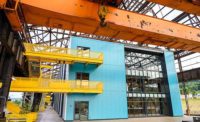New Alabama Initiative Focuses on Workforce Development

Alabama is home to a variety of manufacturers that employ thousands of people, including Airbus, Austal, Boeing, Daimler, GE Appliances, Honda, Hyundai, Lear, Polaris and Toyota. To support local companies and encourage future investments, the University of Alabama recently launched the Alabama Initiative on Manufacturing Development and Education (IMaDE).
The goal of Alabama IMaDE is advanced manufacturing education and workforce development that provides local companies with employees who are well-versed in the latest Industry 4.0 tools and technology.
“Alabama must have an engineering workforce of adequate size and training that is educated in advanced engineering platforms, as well as STEM-related technologies needed to support the growing high-tech and manufacturing sectors,” says Nader Jalili, Ph.D., head of the mechanical engineering department and director of Alabama IMaDE.
“The state must have an adequately trained engineering workforce that is knowledgeable in advanced manufacturing and materials scientific principles, as well as in cutting-edge manufacturing processes and systems, to ensure the manufacturing sector continues to be a driving force for economic development in Alabama,” Jalili points out.
Alabama IMaDE recently moved into a facility that formerly housed a student computing center. It’s located on the first floor of Paty Hall, a dormitory near the College of Engineering. The facility features newly renovated classrooms and labs.
“This new facility is part of an initiative oriented to develop a premier hub for multidisciplinary research and education in intelligent and advanced manufacturing systems and processes,” says Jalili. “It will enable hands-on, project-based learning in robotic manufacturing—taught using real-world industrial robotic manipulators and software—as well as programming, operating and implementing automation systems.”
Alabama IMaDE is composed of four different interconnected components: the state-of-the-art advanced manufacturing facility; a robotics and programmable logic controller (PLC) teaching lab; an advanced and intelligent manufacturing (AIM) lab; and an innovation incubator.
The advanced manufacturing laboratory features six-axis Kuka robots equipped with a variety of end effectors for different applications, such as force control, screwdriving, sealant dispensing and spot welding. An adjacent teaching lab is equipped with PLCs, smaller robots and a coordinate measuring machine.
The AIM lab features a mini factory equipped with collaborative robots from Denso and Motoman. “This enables close human-robot collaboration and hands-on activities,” says Jalili.
The incubator is a space for workforce development and business partnerships. There are work cubicles and places for individuals to have private conferences or meetings to discuss projects they’re working on.
Another important part of Alabama IMaDE is a new program that will offer a degree in manufacturing systems engineering. The first classes will be held this fall.
“The program will provide graduates the skills and knowledge for successful careers in manufacturing, including practical applications ranging from manufacturing processes to cyberphysical systems,” says Jalili. “It will include a series of 15 modular courses that each last four weeks. Students will take three back-to-back courses each semester.
“Non-degree seeking students and industry professionals will also be able to take many of our courses, which will include both in-person and online learning,” explains Jalili. “When someone completes six courses, they’ll receive a certificate.
“The first three foundational courses will cover material handling, PLCs and robotics,” adds Jalili. “They will be the prerequisites to move on further in the program.”
Looking for a reprint of this article?
From high-res PDFs to custom plaques, order your copy today!






